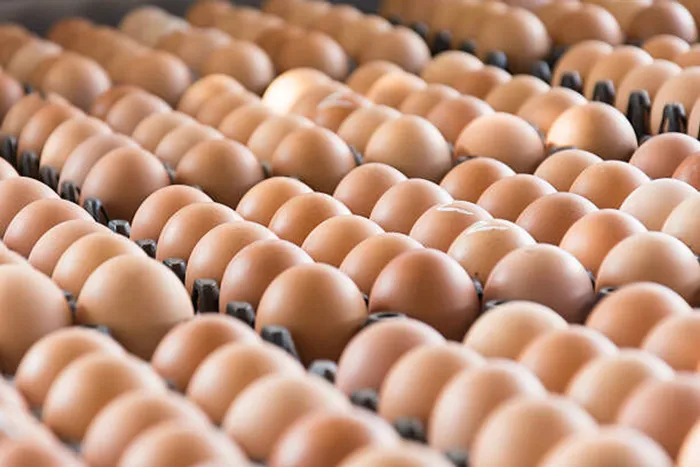
Eggs from chicken farm in packaging that preserves it for sale. Quantum Foods said its trading environment improved markedly during its 2025 financial year when compared with the previous year, when loadshedding and avian influenza negatively impacted the company's operations.
Image: Supplied
Quantum Foods Holdings experienced a surge in its share price on Friday, climbing over 13% after a trading statement indicated an expected increase in headline earnings per share (HEPS) of between 58% and 78% for the year ending September 28, 2025.
This development indicates a significant recovery and improved operational outcomes. Closing at 800 cents on the JSE, Quantum's share price reflects a 13.64% increase, although it still trails behind the previous year's level of R10.07. The company anticipates HEPS to rise to between 127.4 cents and 143.4 cents, up from 80.4 cents reported for the previous financial year.
The forthcoming earnings boost is attributed to markedly enhanced trading conditions when compared to the previous year. This stems from a successful recovery of the company's layer flock, increased feed sales volumes, and heightened sales in day-old broiler and layer livestock.
Additionally, the operational efficiencies, decreased load shedding in South Africa, and solid performance across its subsidiaries in Zambia and Uganda have contributed to a positive outlook.
Notably, the preceding year was marred by significant challenges, including outbreaks of highly pathogenic avian influenza (HPAI) in South Africa, which inflicted damages estimated at R37 million. These outbreaks resulted in reduced livestock volumes, hatching eggs, and table eggs, alongside substantial costs for cleaning and disinfecting affected farms. Furthermore, a high incidence of load shedding contributed to decreased performance across operations in that year.
Looking ahead to the 2025 financial year, Quantum's directors acknowledged that while average egg selling prices remained relatively high, they did dip approximately 17% compared to the prior year, a trend reflecting the recovery of the South African layer flock, which regained stability post-HPAI outbreaks.
Feed costs are reportedly steady, although the average price of yellow maize has risen by 14%, attributed to a lower crop yield in 2024. This increase has led the company to import maize to manage costs more effectively.
The company reported an impressive 79% increase in egg supply, allowing the resumption of operations at its Pinetown egg packing station, previously mothballed due to restricted supply.
Although stronger egg volumes and operational efficiencies supported revenue, the drop in average egg selling prices created challenges that tempered earnings from the egg business compared to last year.
Quantum’s efforts to rebuild its layer flock have coincided with improved availability of replacement birds. This not only bolstered farming efficiencies but also established a solid demand base from external customers. However, customer hesitance regarding orders in the latter half of the year, influenced by price fluctuations and sporadic HPAI incidents, led to imbalances in the supply chain, creating some operational hurdles.
An HPAI outbreak at a Western Cape layer farm resulted in the destruction of around 153 000 hens valued at R8.2m, but the company has not reported any further outbreaks as of late last week.
On the broiler farming front, operational and financial performance has been “excellent,” buoyed by high genetic performance of the Ross 308 birds. Increased volumes from the Hartbeespoort hatchery, coupled with strategic farm conversions to enhance productivity, have driven growth, with day-old chick production climbing by about 6% relative to the previous year.
Despite challenges in some regions like Zambia and Mozambique, where operational conditions have been tough, overall performance across Quantum's African operations has been satisfactory.
Encouragingly, the feed business has thrived, attributing its good results to a recovery in volume, especially from the Pretoria feed mill, complemented by completed repair efforts at damaged facilities.
Visit:www.businessreport.co.za